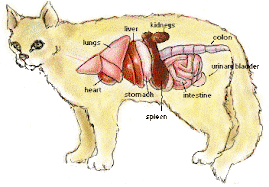skip to main |
skip to sidebar

PET EVACUATIONS IN A DISASTERIn two epidemiological studies of evacuations from disaster, risk factors for household evacuation failure, pet evacuation failure, and pet rescue attempts were characterized. Risk factors were identified using multivariate logistic regression. Case households were defined as those which either failed to evacuate as a unit, evacuated but without their pets (dogs or cats), or evacuated without their pets and later attempted to rescue their pet. Control households were those that either evacuated as a unit, evacuated with their pet, or evacuated and did not attempt to rescue their pet.READ FULL REPORT AND GET TIPS HERE:http://www.animaldisasters.com/Pet%20Owners.htm

Plan your family's (including your pets') safe evacuation in advance.Remember their usual hiding and sleeping places. During a fire, they'll be terrified, and are likely to hide in their favorite retreats.Always have a carrier readily available for cats and small animals and leashes for dogs.**Purchase Evacsack for a space saving and economical emergency transport.In a pinch use a pillow case as a carrier.If there is time before safely exiting with your pet(s), call 911.In a multipet household in which individual collection may be unrealistic, herd the pets outside through doors or windows, if this is safe and feasible.Read Full Report and Tips Here:http://www.geocities.com/ttylerbin/

As winter approaches, many people will "winterize" their automobiles, including a change of antifreeze. Dogs and cats find antifreeze quite tasty and will drink it when given the opportunity. Antifreeze can be deadly even in small doses, around five tablespoons can kill a medium sized dog. A cat can ingest enough to prove fatal by just walking through a puddle of antifreeze and then licking its paws. Not just dogs and cats are at risk, all animals are susceptible. When ingested animals suffer from drunkenness, weakness, depression, staggering, possible seizures, renal failure (kidney) and even death. They may drink lots of water, urinate large amounts and vomit. Antifreeze should be kept away from your pets and all spills should be cleaned up right away. If your pet comes in contact with Antifreeze take him/her to your local veterinarian immediately. Treatment for antifreeze poisoning needs to be started as soon after ingestion as possible to be effective. The earlier treatment is started, the greater the chance of survival. Once kidney failure develops, most animals will die. Read Full Report and Other Winter Hazards Here: http://www.elmorehumane.com/tips.htm






















 Custom
Custom 

